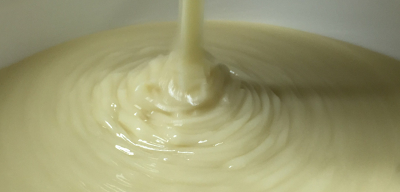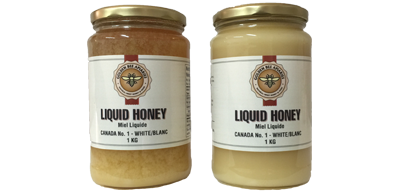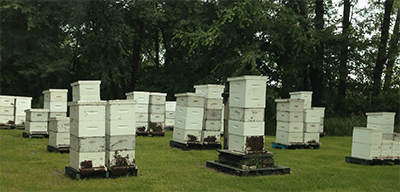How are your bees doing?
This is probably our most frequently asked question. The bees are doing fine and we have had a good track record of having healthy bees. We have not experienced the losses as reported by mainstream media. Bees are living organisms and living things die. Each winter, we loose approximately 5- 15 percent of our hives,but we make new hives each year to recover our losses and winter insurance. Yes, it’s more work, but worth it in the end.
Is your honey pasteurized?
No. Our process of extracting honey is temperature controlled and our honey goes through minimal heating. Our creamed and liquid honey is unpasteurized. This will ensure you get all the healthy benefits of natural, raw honey. It’s also important to know that honey is perfectly safe to eat in its unpasteurized state. It’s actually healthier than pasteurized honey because it contains all the enzymes and minerals.
What is creamed honey?
Creamed honey is liquid honey that has already gone through a controlled granulation process. All unpasteurized honey will granulate or crystallize with time. When it granulates, you will see larger crystals and your honey will be quite hard. This is normal and reheating your honey will make it liquid again. If you don’t like to reheat honey to make it spreadable, creamed honey is a great solution.
Creamed honey is made by adding soft creamed honey to a batch of liquid honey. It is mixed and cooled while the entire batch takes on the consistency of the ‘seed’ honey you added. The result is honey that is soft, smooth and spreadable. Note: No cream is added to creamed honey. It’s also sometimes called whipped honey, spun honey or churned honey.
Creamed honey is the honey we personally like because you never have to reheat it. It will stay consistently soft and smooth until used. Creamed honey can be heated and it will return to its liquid form.
Do you add anything to your creamed honey?

No. Nothing but previously creamed honey gets added to make creamed honey. So you can be confident that you get 100% pure and natural honey. The ‘seed’ honey added is usually from a previous batch.
Why is your creamed honey softer than the honey I am used to?
This is a trade secret! We have tried many different methods of making creamed honey and are satisfied with our current method with makes nice consistent batches. The characteristics of good creamed honey is a small crystal size, moisture and temperature control, and the right processing equipment.
I ordered liquid honey. Why is it hard?
Our honey is unpasteurized and all unpasteurized honey will harden with time. This is called granulation and is a characteristic of good honey with the healthy enzymes still intact. The length of time it takes honey to granulate depends on the nectar source. Canola honey, for example, will set much quicker than other sources. We’ve had honey granulate in 2 weeks!
We do not reheat honey at time of sale unless specially instructed to. Once we seal our containers, they do not get further processed.
How do I re-liquefy my honey?

We find the best way is to take a pot and put water in it. Gently heat it to 35-40 C. Put your jar of honey inside the pan and leave it until your honey is runny. Some people use a microwave, but that can alter the appearance, taste and health benefits of honey. Heating honey to 60 C will cause it to be pasteurized and it will remain in its liquid state.
Can my honey go bad?
Pure honey that has a moisture of 17.5 percent or less should have an indefinite shelf life. Your honey may appear darker with time but with proper storage, you can use your honey years after you’ve bought it. Honey that is wet can get a fermented/sour smell to it as it ages.
Where does your honey come from?
Our honey is from our own apiaries (bee yards). Bees bring back nectar from local floral sources from a 2-4 mile radius. Our nectar comes mostly from canola, but also dandelions, clover, and wildflowers that grow in abundance. In late fall, we also get sunflower honey if some are grown locally. So our honey is a taste of local nectar sources.
Is your honey organic?

We don’t call our honey organic because we can’t control where our bees go. Local farmers use chemicals and it’s difficult to avoid exposure. We certainly try to minimize exposure to harmful chemicals both in and outside the hive, but complete control is almost impossible to achieve. Our honey is tested by CFIA and you can be sure that the honey you get is as chemical free as possible.
Do you have buckwheat honey?
There is no buckwheat in our area. We do not have a demand for this honey and don’t stock it.